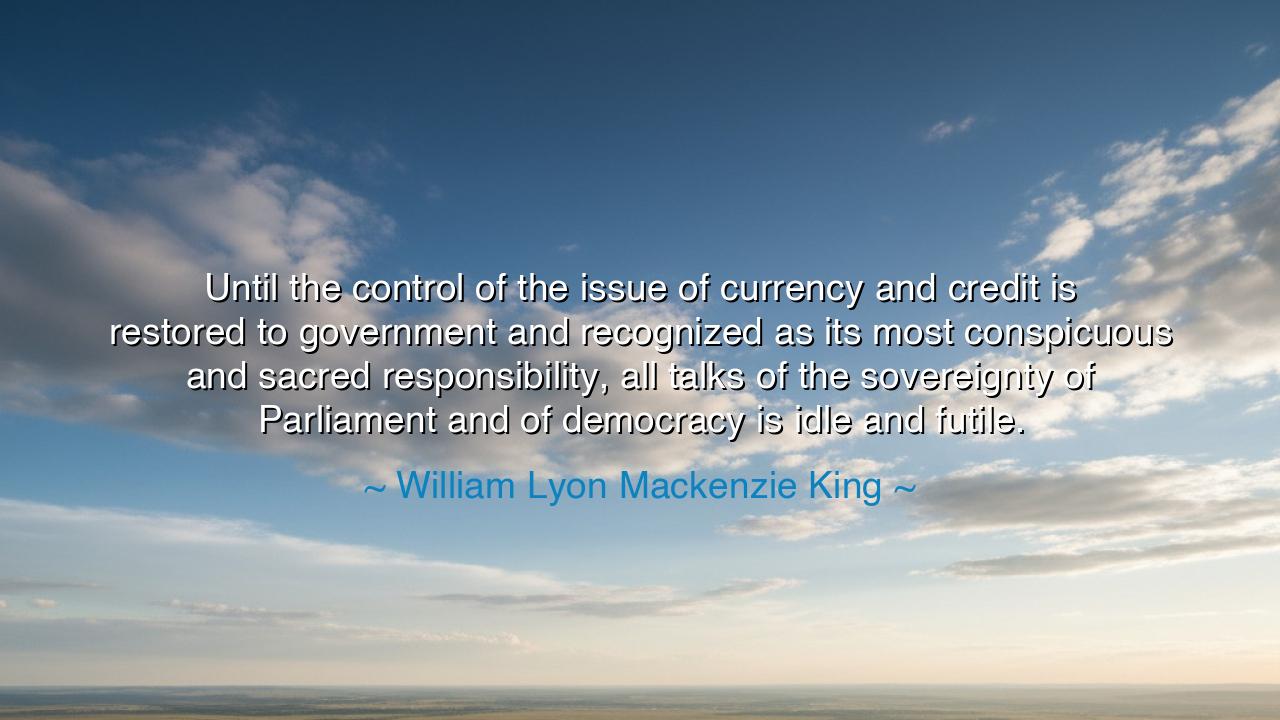
Until the control of the issue of currency and credit is restored
Until the control of the issue of currency and credit is restored to government and recognized as its most conspicuous and sacred responsibility, all talks of the sovereignty of Parliament and of democracy is idle and futile.






"Until the control of the issue of currency and credit is restored to government and recognized as its most conspicuous and sacred responsibility, all talks of the sovereignty of Parliament and of democracy is idle and futile." – William Lyon Mackenzie King
In these resolute words, William Lyon Mackenzie King, the longest-serving Prime Minister of Canada, unveils a truth that lies at the very foundation of political freedom and moral governance. He declares that no nation can truly be sovereign if it does not control its own money, for currency and credit are not mere tools of trade—they are the lifeblood of a people’s independence. To surrender them into private hands, he warns, is to hand over the keys of power to those who neither answer to the people nor act in their name. A government that cannot command its own economic destiny is but a shadow of authority—its parliaments speak loudly, but their words echo hollow.
The origin of this quote lies in the early 20th century, when King witnessed the growing domination of financial institutions over public policy. In the wake of the Great Depression, when the world’s economies lay in ruin, he saw how private banks, not elected governments, controlled the flow of credit, deciding who would prosper and who would perish. King’s insight was born of both observation and conviction: that economic power is political power, and that democracy cannot live under the rule of money-changers. His words were a warning to all nations—that if the creation of money is left to profit-driven entities, then even the noblest constitution becomes a hollow pretense.
Throughout history, empires have risen and fallen upon this truth. The Roman Republic, once the beacon of civic virtue, crumbled not from invasion alone, but from debt and financial corruption that enslaved its citizens to creditors. When Caesar returned from Gaul, he found not a free Rome, but a republic chained to moneylenders. Similarly, in modern times, governments that bow to private interests—be they corporations or central banks—find themselves unable to govern for the common good. For whoever controls the purse controls the people, and whoever controls credit commands the fate of nations.
To understand King’s warning more vividly, consider the story of Abraham Lincoln during the American Civil War. Faced with the immense cost of preserving the Union, Lincoln refused to let private bankers dictate terms at ruinous interest rates. Instead, he issued Greenbacks—government-backed currency free from private debt. In doing so, he affirmed the principle that money should serve the people, not enslave them. It was a bold act of sovereignty, one that echoes King’s belief that the issuance of money is not merely an economic task, but a sacred duty of government—a covenant between a nation and its citizens.
Mackenzie King’s words remind us that democracy is not upheld by ballots alone, but by the independence of its economic foundations. When governments yield control of currency to private powers, they become like captains who steer without a rudder. Policies meant to serve the public good are bent to serve profit; laws meant to protect the weak are written to favor the strong. A people may vote, speak, and dream freely, but if they must live in perpetual debt to invisible masters, then their liberty is only an illusion. True sovereignty is not proclaimed—it is practiced, and its measure lies in who holds the power to create and direct the nation’s wealth.
But this quote also speaks beyond the realm of economics. It reminds us of the deeper moral truth that power must always answer to responsibility. To “restore control” is not merely to seize authority—it is to wield it with integrity. King calls it a “sacred responsibility” because the management of wealth touches every life: the farmer who tills the land, the worker who labors by dawn, the mother who feeds her child. When currency becomes an instrument of greed, it corrodes the soul of society; when it serves the collective good, it becomes an offering of justice.
The lesson, then, is clear: political freedom without economic independence is an empty promise. Democracy must be defended not only in parliaments, but in treasuries. The creation of money, the flow of credit, and the distribution of wealth must be guided by public purpose, not private profit. For the strength of a nation is not found in its banks, but in the dignity and security of its people.
And so, the practical actions are these: demand transparency in how governments create and manage money; question who benefits from national debt; support policies that align finance with the public good rather than corporate interest. Remember always that the power to issue currency is the power to shape destiny. As Mackenzie King knew, a democracy that forgets this truth becomes a democracy in name only—its people free in word, but bound in deed, until they reclaim the sacred trust that makes them sovereign once more.






AAdministratorAdministrator
Welcome, honored guests. Please leave a comment, we will respond soon